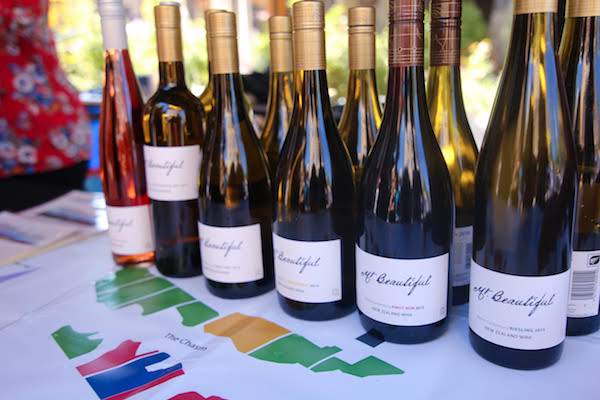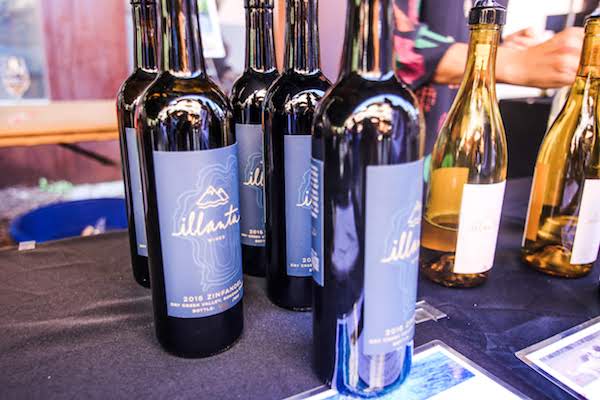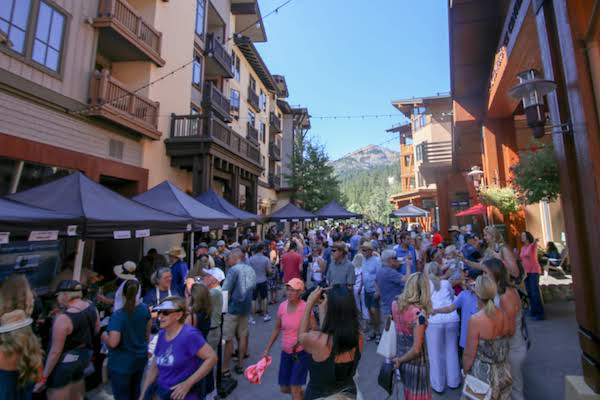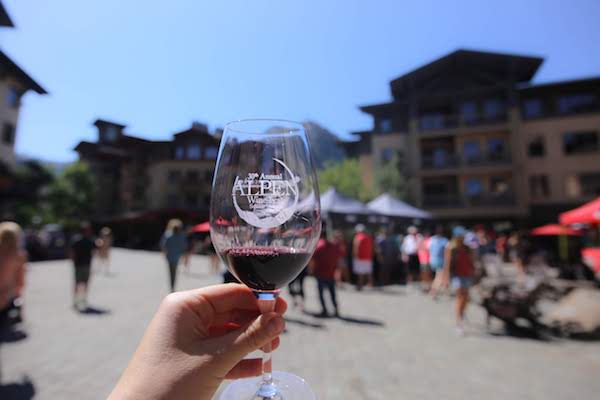That may not come as a surprise for locals, as the Alpen Wine Fest has been happening for decades: 2018 was the 30th year of the event. According to Caroline Ross, executive director of the Squaw Village Neighbourhood Company, more than 40 wineries were in attendance this year — a half dozen more than 2017’s event. Offerings included wineries from well beyond the Northern California region, coming from as far as North Canterbury, New Zealand. According to Tiffany Tonnerre, a regional sales manager for Mt. Beautiful Winery, it has attended the festival for the last five years.
“It doesn’t take much to convince me to come to Squaw,” Tonnerre jokes.

In 2018, Mt. Beautiful offered tastings of six varietals of red and white wines, including its popular rosé, with hints of watermelon and grapefruit.
That’s not to say attendees aren’t treated to some of California’s finest wines, however. New to the Alpen Wine Festival in the last two years is Tahoe City-based Illanta Wines. Formed in 2016 by two Tahoe locals, Illanta wines produces “Italian-style” wines with grapes sourced from what co-owners Allison Yonto and Jessica Stanley think are California’s best regions, sourcing from the hills of Santa Barbara for Chardonnays and grapes for their zinfandel from organic vineyards near Healdsburg, Calif.

Though Illanta Wines is a new player in the California wine scene, Yonto says they’ve already seen early adoption of their products, which now are sold in the Uncorked Wine Bars around the North Shore, as well as at select, upscale restaurants.

The Alpen Wine Festival is spread across Squaw Village so that attendees have plenty of room to stop and chat with pourers and owners and learn about the offerings as they sample. In addition to wines ranging from sparkling whites and Rieslings to peppery, oakey cabs and cab francs, the event included live music, al-fresco dining in the village restaurants, and a complimentary wine glass for each guest with an etching of the elegant Alpen Wine logo.

This year’s entertainment included classics from Grass Valley-based Beyond the Rails and Incline Village songwriter Jeff Jones.

According to Liesel Kenney, public relations dDirector for Squaw Valley Alpine Meadows, the event will continue into future years.
“Events like the Alpen Wine Fest are really a jump-off point to creating a long-term love for the area,” she says. “We’ve very fortunate to be geographically located in a place where wine, food and adventure culture converge.”
Kenny says Squaw will continue to host food and drink events earlier in the spring and later in the fall as Squaw moves toward becoming more of a year-round culinary destination. Its next food-focused event will be Squaw’s annual Oktoberfest, slated for September 22nd; also the start date of the famous Munich Oktoberfest that inspires many of the Squaw celebration’s programming. While the Alpen Wine Festival offers a higher-end opportunity to expand one’s viticultural knowledge, Oktoberfest is all about brews, with family-friendly Bavarian competitions and music throughout the day.
“It’s amazing to think how much the event has grown in 30 years,” says Kenney, “and the support that we have seen for Can Do Multiple Sclerosis,” the beneficiaries of the event’s proceeds.
Though 2018’s total contribution is still being tallied, the event raised more than $25,000 to help fund health and wellness education programs for the multiple sclerosis-focused nonprofit.
The next Alpen Wine Festival will be held on Sept. 1, 2019.
Suzie Dundas is a Lake Tahoe-based freelance writer. She writes about everything from adventure travel to social media and inspired food and drink. You can find more of her work at Suziedundas.com.
Nevada Economic Development Conference highlights suburban neighborhood trend.
Courtesy of Nevada Economic Development Conference
Will community gardens supplant the clubhouse? Will fairway views fade into farmscapes, and the fast-rolling greens of the golf course become rows of kale, cabbage, and spinach?
In the late 1990s and early 2000s, new housing in Northern Nevada almost required that there be a golf course winding amid the homes.
But in recent years, many millennials, baby boomers, and retirees are seeking out neighborhoods that have more direct relationships to the land and to local food as urban landscapes turn into fresh-food deserts. An increasingly popular subdivision design called an agrihood is helping to fulfill this desire to connect more closely with community, nature, and our food supply.
The Fourth Annual Nevada Economic Development Conference set for Aug. 20-22, 2018 at the Atlantis Casino & Resort in Reno, and edible Reno-Tahoe magazine is a media sponsor for the event. This year’s conference will feature a presentation entitled Agrihoods 2.0 as part of its popular Agribusiness sessions. It will highlight the Corley Ranch in Douglas County as well as other agrihood developments that have sprung up around the United States.
Changes in the ’hood
Loosely defined by the Urban Land Institute as master-planned housing communities with working farms as their focus, many agrihoods offer ample green space, barns, outdoor kitchens, and farm-to-table restaurants.
Session speaker Jeff Birkby, who has managed sustainable agriculture and community development projects for nonprofit organizations and state and federal government agencies, says there is pent-up demand to develop food sources closer to our kitchen tables.
INSERT PHOTO: Birkbyphoto (*Can we put this photo small, to the left of the “Changes in the hood” first paragraph, as opposed to all by itself?)
CAPTION: Jeff Birkby
“We are beginning to see in-fill agrihoods that are turning blighted areas of cities, such as Detroit, into vibrant and desirable communities,” Birkby says. “This next phase of agrihood development looks to transform abandoned urban centers, using existing city property, instead of developing housing around pristine land outside of city limits.”
The Urban Land Institute estimates that, as of 2014, there were more than 200 agrihoods either developed or in the planning stages in the United States.
Agrihoods 2.0 session speaker Mark Neuffer, principal of Alta Consulting in San Jose, Calif., is developing Farmstead at Corley Ranch as one of those. Adjacent to what already is a working ranch, the proposed 250 homes will offer nearby amenities such as a community garden, greenhouse, and orchard.
INSERT PHOTO: mark-nueffer (Same placement as Birkby, to the left of the paragraph above)
CAPTION: Mark Nueffer
Neuffer, who has successfully developed numerous housing projects in the Sparks area, cites the Rancho Mission Viejo project in San Juan Capistrano, Calif., as a model for the Farmstead at Corley Ranch. There, residents have access to communal farms with orchards and workshop space, raised planters, in-ground crops, fruit trees, and community events featuring area farmers lending a hand in the communal gardens.
“I think this is a more meaningful housing product,” Neuffer says. “The golf course housing project doesn’t articulate what today’s home buyer is looking for.”
Plus, agrihoods offer developers a lower cost for amenities, Birkby says
“These costs, though significant, can be less than one-fifth of the costs of developing and maintaining a professionally designed golf course. And the consumer demand for housing in new agrihoods is tremendous,” he says.
Rancho Mission Viejo already is developing its second agrihood housing development, and agrihoods are popping up from Florida to Hawaii. In Davis, Calif., a 100-acre development called The Cannery is built around a working farm that will sell to local restaurants and grocers. The agrihood is built on the site of a former Hunt-Wesson tomato cannery — an excellent example of repurposing an industrial site, Birkby notes.
INSERT PHOTO: cannerydavis (size can be full, but not huge)
CAPTION: The Cannery in Davis is an operating agrihood
Agrihoods 2.0 also will feature Jack Jacobs, owner and manager of Jacobs Family Berry Farm. His recent Carson Valley agricultural activities have included 2018 Conservation Award for work to advance agriculture in Douglas County-Carson Valley.
INSERT PHOTO: Jack-Jacobs (*Note: Same placement and sizing as other head shots, please, next to the paragraph above)
CAPTION: Jack Jacobs
This trio will present the processes, challenges, and successes of the agrihood, as well as how the agrihood can benefit the entire community.
For details about this session and many other sessions on topics revealing the new Nevada economy, or to register, visit Nvedc.com.
Nevada Economic Development Conference
Tues., Aug. 21 and Wed., Aug. 22, 2018
Tracks include: Agribusiness, Economic Development, Manufacturing, Transportation/Infrastructure and Workforce Development.
The cost ($175 before July 6; $200 after July 6) includes opening sessions, lunch with keynote speakers, and exhibit hall reception. A one-day conference pass is $125 ($150 after July 6).
A pre-conference tour and workshop, Connecting Nevada to the Global Economy, on Aug. 20 will visit the SWITCH facility located at the Tahoe-Reno Industrial Center. A separate registration fee of $75 will be charged for this portion of the conference ($100 after July 6), which includes lunch and transportation.
This event is recognized by the International Economic Development Council as a professional development event that counts toward the recertification of Certified Economic Developers.


